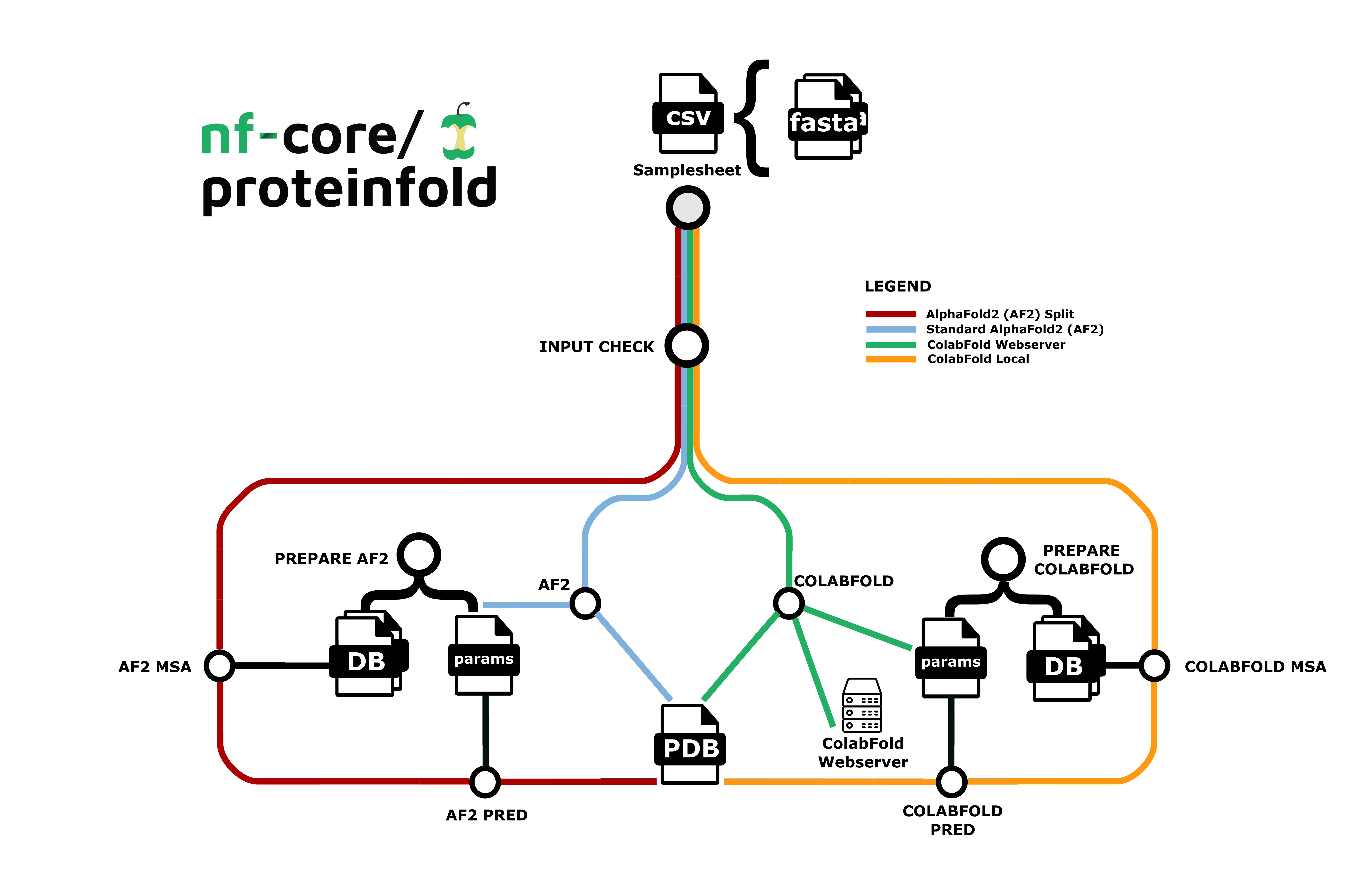nf-core/proteinfold
Protein 3D structure prediction pipeline
Introduction
nf-core/proteinfold is a bioinformatics best-practice analysis pipeline for Protein 3D structure prediction pipeline.
The pipeline is built using Nextflow, a workflow tool to run tasks across multiple compute infrastructures in a very portable manner. It uses Docker/Singularity containers making installation trivial and results highly reproducible. The Nextflow DSL2 implementation of this pipeline uses one container per process which makes it much easier to maintain and update software dependencies. Where possible, these processes have been submitted to and installed from nf-core/modules in order to make them available to all nf-core pipelines, and to everyone within the Nextflow community!
On release, automated continuous integration tests run the pipeline on a full-sized dataset on the AWS cloud infrastructure. This ensures that the pipeline runs on AWS, has sensible resource allocation defaults set to run on real-world datasets, and permits the persistent storage of results to benchmark between pipeline releases and other analysis sources.The results obtained from the full-sized test can be viewed on the nf-core website.
Pipeline summary

-
Choice of protein structure prediction method:
i. AlphaFold2
ii. AlphaFold2 split - AlphaFold2 MSA computation and model inference in separate processes
iii. ColabFold - MMseqs2 API server followed by ColabFold
iv. ColabFold - MMseqs2 local search followed by ColabFold
Quick Start
-
Install
Nextflow(>=22.10.1) -
Install any of
Docker,Singularity(you can follow this tutorial),Podman,ShifterorCharliecloudfor full pipeline reproducibility (you can useCondaboth to install Nextflow itself and also to manage software within pipelines. Please only use it within pipelines as a last resort; see docs). -
Download the pipeline and test it on a minimal dataset with a single command:
nextflow run nf-core/proteinfold -profile test,YOURPROFILE --outdir <OUTDIR>Note that some form of configuration will be needed so that Nextflow knows how to fetch the required software. This is usually done in the form of a config profile (
YOURPROFILEin the example command above). You can chain multiple config profiles in a comma-separated string.- The pipeline comes with config profiles called
docker,singularity,podman,shifter,charliecloudandcondawhich instruct the pipeline to use the named tool for software management. For example,-profile test,docker. - Please check nf-core/configs to see if a custom config file to run nf-core pipelines already exists for your Institute. If so, you can simply use
-profile <institute>in your command. This will enable eitherdockerorsingularityand set the appropriate execution settings for your local compute environment. - If you are using
singularity, please use thenf-core downloadcommand to download images first, before running the pipeline. Setting theNXF_SINGULARITY_CACHEDIRorsingularity.cacheDirNextflow options enables you to store and re-use the images from a central location for future pipeline runs. - If you are using
conda, it is highly recommended to use theNXF_CONDA_CACHEDIRorconda.cacheDirsettings to store the environments in a central location for future pipeline runs.
- The pipeline comes with config profiles called
-
Start running your own analysis!
The pipeline takes care of downloading the required databases and parameters required by AlphaFold2 and/or Colabfold. In case you have already downloaded the required files, you can skip this step by providing the path using the corresponding parameter [
--alphafold2_db] or [--colabfold_db]
-
Typical command to run AlphaFold2 mode:
nextflow run nf-core/proteinfold \ --input samplesheet.csv \ --outdir <OUTDIR> \ --mode alphafold2 \ --alphafold2_db <null (default) | DB_PATH> \ --full_dbs <true/false> \ --alphafold2_model_preset monomer \ --use_gpu <true/false> \ -profile <docker/singularity/podman/shifter/charliecloud/conda/institute> -
Typical command to run AlphaFold2 splitting the MSA from the prediction execution:
nextflow run nf-core/proteinfold \ --input samplesheet.csv \ --outdir <OUTDIR> \ --mode alphafold2 \ --alphafold2_mode split_msa_prediction \ --alphafold2_db <null (default) | DB_PATH> \ --full_dbs <true/false> \ --alphafold2_model_preset monomer \ --use_gpu <true/false> \ -profile <docker/singularity/podman/shifter/charliecloud/conda/institute> -
Typical command to run colabfold_local mode:
nextflow run nf-core/proteinfold \ --input samplesheet.csv \ --outdir <OUTDIR> \ --mode colabfold \ --colabfold_server local \ --colabfold_db <null (default) | PATH> \ --num_recycle 3 \ --use_amber <true/false> \ --colabfold_model_preset "AlphaFold2-ptm" \ --use_gpu <true/false> \ --db_load_mode 0 -profile <docker/singularity/podman/shifter/charliecloud/conda/institute> -
Typical command to run colabfold_webserver mode:
nextflow run nf-core/proteinfold \ --input samplesheet.csv \ --outdir <OUTDIR> \ --mode colabfold \ --colabfold_server webserver \ --host_url <custom MMSeqs2 API Server URL> \ --colabfold_db <null (default) | PATH> \ --num_recycle 3 \ --use_amber <true/false> \ --colabfold_model_preset "AlphaFold2-ptm" \ --use_gpu <true/false> \ -profile <docker/singularity/podman/shifter/charliecloud/conda/institute>
Documentation
The nf-core/proteinfold pipeline comes with documentation about the pipeline usage, parameters and output.
Credits
nf-core/proteinfold was originally written by Athanasios Baltzis (@athbaltzis), Jose Espinosa-Carrasco (@JoseEspinosa) and Luisa Santus (@luisas) from The Comparative Bioinformatics Group at The Centre for Genomic Regulation, Spain under the umbrella of the BovReg project and Harshil Patel (@drpatelh) from Seqera Labs, Spain.
We thank the following people for their extensive assistance in the development of this pipeline:
Many thanks to others who have helped out and contributed along the way too, including (but not limited to): Norman Goodacre and Waleed Osman from Interline Therapeutics (@interlinetx), Martin Steinegger (@martin-steinegger), Raoul J.P. Bonnal (@rjpbonnal) and Leila Mansouri (@l-mansouri)
Contributions and Support
If you would like to contribute to this pipeline, please see the contributing guidelines.
For further information or help, don’t hesitate to get in touch on the Slack #proteinfold channel (you can join with this invite).
Citations
An extensive list of references for the tools used by the pipeline can be found in the CITATIONS.md file.
You can cite the nf-core publication as follows:
The nf-core framework for community-curated bioinformatics pipelines.
Philip Ewels, Alexander Peltzer, Sven Fillinger, Harshil Patel, Johannes Alneberg, Andreas Wilm, Maxime Ulysse Garcia, Paolo Di Tommaso & Sven Nahnsen.
Nat Biotechnol. 2020 Feb 13. doi: 10.1038/s41587-020-0439-x.